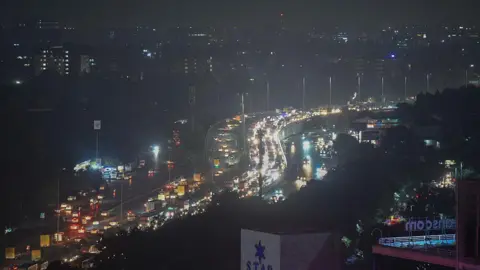Maharashtra's political landscape is heating up as tensions over language have taken a violent turn. The conflict began following the state government's decision to mandate Hindi as a third language in state-run primary schools alongside Marathi and English. Civil society groups and opposition leaders swiftly condemned this move, accusing the government of imposing Hindi, which is primarily spoken in northern India. The controversy serves as a reminder of historical tensions in a nation where states were often founded on linguistic lines, making language a symbol of regional pride and identity.
Maharashtra's ruling coalition, led by the Bharatiya Janata Party (BJP), faced backlash for what was seen as an attempt to overshadow Marathi cultural significance. Following protests, the state government suspended its language policy and formed a committee for review, yet public dissatisfaction persisted.
Violence has ensued amid these discussions. Recently, individuals were attacked in separate incidents for speaking Hindi or requesting service in languages other than Marathi. Social media circulated distressing footage of a shop owner assaulted for his language choice, amplifying public outrage.
Amid these challenges, political alliances have shifted. Rivals Uddhav Thackeray and Raj Thackeray, prominent figures in Maharashtra's politics, united at a rally against Hindi imposition, an act interpreted as an effort to regain political capital ahead of upcoming municipal elections. Both leaders have historic ties to nativist politics rooted in protecting local identity.
While language policies have prompted protests, critics argue that such stances risk heightening societal divisions. Editorials caution against the dangers of identity-driven politics catering to regional pride, suggesting that constituents desire tangible progress over divisive rhetoric. As multilingual discourse continues in Maharashtra, the challenge remains to balance cultural pride with societal unity and inclusive growth.
Maharashtra's ruling coalition, led by the Bharatiya Janata Party (BJP), faced backlash for what was seen as an attempt to overshadow Marathi cultural significance. Following protests, the state government suspended its language policy and formed a committee for review, yet public dissatisfaction persisted.
Violence has ensued amid these discussions. Recently, individuals were attacked in separate incidents for speaking Hindi or requesting service in languages other than Marathi. Social media circulated distressing footage of a shop owner assaulted for his language choice, amplifying public outrage.
Amid these challenges, political alliances have shifted. Rivals Uddhav Thackeray and Raj Thackeray, prominent figures in Maharashtra's politics, united at a rally against Hindi imposition, an act interpreted as an effort to regain political capital ahead of upcoming municipal elections. Both leaders have historic ties to nativist politics rooted in protecting local identity.
While language policies have prompted protests, critics argue that such stances risk heightening societal divisions. Editorials caution against the dangers of identity-driven politics catering to regional pride, suggesting that constituents desire tangible progress over divisive rhetoric. As multilingual discourse continues in Maharashtra, the challenge remains to balance cultural pride with societal unity and inclusive growth.






















